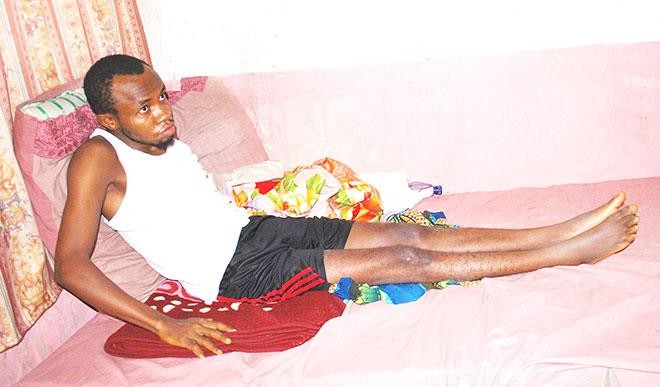
Munir Lawal went on an errand for his mother one fateful day. Little did he know he would be attacked and lose his ability to walk.
Munir Lawal, once able-bodied, is now confined to his mother’s one room home, incapacitated, only because he ran an errand for her one fateful day.
On June 5, 2015, Lawal, a 25-year-old student of the Department of Regional and Urban Planning, Faculty of Environmental Design, Ahmadu Bello University, Zaria, Kaduna State, was stabbed in the neck by armed robbers who ran off with his mobile phone. This has resulted in his inability to move his lower limbs.
When Daily Trust visited Lawal at his parents’ house on Ruma Road, Off Kabala Road, Sabon Gari in the Tudun Wada area of Kaduna metropolis, it took the help of his mother to move him from a lying to a sitting position as she handed him a cup, bowl and tooth brush to brush his teeth right there on the bed.
Lawal, it was observed, lies on the bed from morning till night, and has been doing so for the past 240 days. Narrating his ordeal, Lawal, an indigene of Kaduna South local government area, pleaded with well-meaning Nigerians to come to his aid, saying his dream is to become a city doctor in line with his course of study.
“That day, my mom sent me to my sister’s house in an area called Makarfi Road in Rigasa, Kaduna South local government area,” he recalled. “When I got to her house around 8 pm, I continuously banged on the gate and got no response because their generator was on, so I brought out my mobile handset to call her so that she could open the door for me, and out of nowhere, I received a stab in my neck which resulted to my sudden inability to move my lower limbs and they took away my hand set,” Lawal said almost in tears.
After he was stabbed, the neighbours heard his scream and rushed to his aid, but by then, the person that stabbed him had already ran away. They called his sister’s husband and he was rushed to the nearest hospital where the wound was stitched and drugs were prescribed for him. He was then taken back home as they said he may get better in the morning. Lawal had told the doctor that he could not feel any sensation in his lower limbs, but they assured him that he would get better by morning, he narrated.
“The next morning, I still complained to my parents that I cannot feel anything in my lower limbs, so they took me to 44 Army Reference Hospital. Unfortunately, the hospital authorities said they did not have bed space to admit me, so they advised us to either go to ABUTH, Shika or St. Gerald Specialist hospital,” the aspiring city doctor stated.
“I spent four days at St. Gerald before we were referred to either Air Force Base or 44 Reference hospitals for a Magnetic Resonance Imaging (MRI). We did the MRI and after that, we were doing nothing at the hospital, so we just requested for a transfer letter to ABU, Shika. But on getting there we discovered that they were on strike at that time,” he said.
“The neuro-surgeon at ABUTH promised to treat me at Jinya Specialist Hospital, a hospital that belongs to my uncle of which the doctor is an ex-staff. I underwent surgery there and after the surgery he told me to start attending physiotherapy and monitor the improvement,” Lawal said.
He said he attended therapy at Barau Dikko for about three months without any sign of improvement, so he stopped. That was when he started discussing with hospitals in China, India and Thailand through the internet and learnt that some Indian doctors were consulting patients at Al-Mansur Hospital along Isa Kaita Road in Kaduna.
“I managed to see the doctors, and they told me that my problem is curable through either injection therapy or Iveda treatment; they also told me that they could use both treatments to cure me,” Lawal narrated.
“After the whole consultations, we exchanged contacts and they sent me an invoice for the medical bill of $18,000 for the medical treatment alone and I would still require transportation and accommodation when I am an outpatient as they said they only provide accommodation for in-patients,” he added.
“According to them, we will have to spend two months in India and there are only 15 days for in-patients, so we need to get funds for about 45 days. Even though they said they will also provide transportation within India, we have gotten our international passports, mine and my elder brother’s; all that we are lacking now is the funding for treatment,” the under graduate said.
Commenting on how he has been coping with his situation, he said “the difference between now and then is that, in the past, I did not have any sensation in my lower limbs, but now, the legs swing on their own and there is extreme pain in my lower limbs, I used to feel as if water was being boiled in my body which the doctors say is a good sign because it shows that the limbs are still functioning.”
Lawal added that: “We have sent letters requesting for assistance to the state governor, Malam Nasir el-Rufai, the senator representing Kaduna North, Shehu Sani and they have received it but unfortunately, up till now, there is no reply from them.”
On her part, Furaira, Lawal’s mother, said the past eight months have been the most challenging of her life. “I saw my able-bodied son rendered disabled and I have tried to hide my grief as I continue to pray to almighty Allah to bring an angel to his rescue,” she said. “My son now uses adult diapers worth N12, 000 monthly because he cannot go to the toilet on his own, I have to virtually do everything for him-a young man confined to bed for no just cause,” the mother lamented.
“I am just a petty trader and it is with the help of God, family, friends and well-wishers that we have been surviving because from then till now, I can say we have spent well over N1 million,” she said.
Muhammad Auwal, a representative of Youth Making a Difference Foundation, a non- governmental organisation and a graduate of ABU who has been following Lawal’s case, said members of the foundation have tasked themselves N1000 each towards his plight.
“I got wind of Munir’s predicament four months ago and even though everyone was being sympathetic to his plight, we decided to take a bold step on how to resolve his problem by connecting with people we know,” Auwal explained.
“We are working with the British Council and the Guidance and Counselling director of ABU who promised to have a meeting with his parents. We intend to go as far as ensuring that Munir walks again, as we are planning on launching rallies in ABU, musical concerts where people will pay for entertainment, but the musicians will sing for free. And ABU students like entertainment a lot, so we will produce T-shirts as a way of raising funds towards Munir’s plight,” he said.

 Join Daily Trust WhatsApp Community For Quick Access To News and Happenings Around You.
Join Daily Trust WhatsApp Community For Quick Access To News and Happenings Around You.


